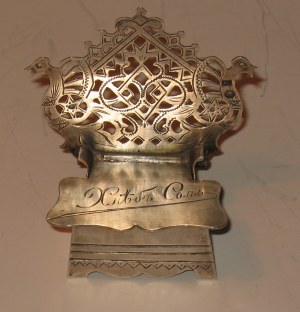 Willand Ringborg presents the
final article of his trilogy on Russian salt
thrones:
Willand Ringborg presents the
final article of his trilogy on Russian salt
thrones:
Ornamental shaping of silver Salt thrones from Russia

The salt throne or salt chair is often associated with its origin
in Russian rural life, its historicism and the
importance of its ornamental and decorative tradition.
The 'izba', the small wooden house, represented an
important link to peasant life and romanticism and had a
double influence on the shaping of salt chairs...
click here |
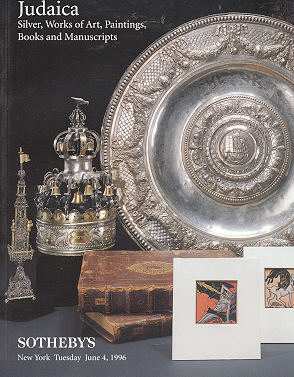 Giorgio Busetto presents:
Giorgio Busetto presents:
Judaica silver: a selection of Jewish ritual objects

Since ancient times silver was the preferred material
for making the Kiddush cups, Hanukkah lamps, Torah
decorations and the dozens of other objects used in
observing the 'Mitzvot' (commandments).
Although silver has been important in the fashioning of
secular and religious objects for millennia, very little
has survived which was made specifically for Jewish ritual use before
the 17th century.
Most of the objects in museum and private
collections of Judaica date from the 17th, 18th, and
19th centuries...
click here |
Welcome to new ASCAS members:
Christine Bennett-Emery - USA
Arnaldo Biraghi - Italy
Dick Jaco - USA
Garry Lillyman - Australia
Lawrence S. London - USA
Robert Looker - USA
Patrick Lowry - Northern Ireland UK
Tony Marchant - Australia
Francesca Rapposelli - Italy
Laura Semenza - Italy
Peter Trunzo - USA
Alan Yates - South Africa
Members' Window # 28
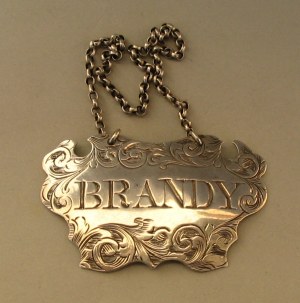 Giorgio Busetto presents:
Giorgio Busetto presents:
A Victorian silver wine label

In about 1755 was introduced a glass decanter upon which
was engraved the name of the wine it should contain. In
due course decanters in blue, green and amethyst glass
with the names of their proper content written in gold
lettering began to be made.
They were all suggested by a new device that had
recently been put on the market by silversmiths: known
then as a bottle ticket, but nowadays called a wine
label...
click here

|
Richard Rattenbury writes:
Dear Silver Association Members:
This museum has recently obtained the Selfridge Trophy, won by
distaff bronc rider Bonnie McCarroll at Tex Austin's first
international rodeo held at Wembley Stadium, London, England,
summer of 1924. An important and most imposing piece among rodeo
trophies.
Anything you might tell me about the origin of this piece would
be most appreciated.
The marks are:
From the left: First mark: impression rather like the shape of
Mickey Mouse head with raised 'M' at upper left; then & then 'H'
at upper right; and 'Co' and 'Ld' at lower center. We think this
mark may be the maker??? Can anyone ID it?
Second mark: square impression with rounded corners with a
raised 'crown' motif; take it this is city of Sheffield, England?
Third mark: rather rectangular impression with rounded corners
with raised 'lion' motif; take it this indicates .925 Sterling?
Fourth mark: square impression with rounded corners with letter
'e' raised within; take it this is the year created?
The inside of the removable lid of the cup also has marks one,
three, and four, as above.
Many thanks for any specific information...particularly the
maker.
I enclose also another image
showing what I believe is the maker's mark inside the base of a
different trophy cup, which perhaps some in the ASCAS can
identify as well (it is also marked STERLING). This is the
Argonne Trophy won by Bonnie McCarroll as World Champion Cowgirl
at the first Madison Square Garden (New York City) rodeo in
1922. I think this is likely an American product. The trophy was
sponsored by the Argonne Association, an affiliation of
Manhattan socialites that raised money for the support of French
children orphaned in the First World War.
I hope these pieces and puzzles are of interest to your
membership and that they can shed some light on who made them.
Once again, my sincere thanks for your interest.
Cordially yours,
Richard Rattenbury
Curator of History
National Cowboy and Western Heritage Museum
1700 N.E. 63rd Street
Oklahoma City, OK 73111
Dear Mr Rattenbury,
ASCAS is honoured to collaborate with National Cowboy & and
Western Heritage Museum.
This is the information I may directly supply:
the mark of the Selfridge Trophy was made by Martin, Hall &
Co and assayed in Sheffield in 1922.
Martin, Hall & Co was active in Sheffield, Shrewsbury Works,
47-55 Broad St Park, from 1854 to 1934. The partners were Robert
Martin & Ebenezer Hall and became 'Ltd' in 1867;
the Argonne Trophy bears a mark that I believe belongs to Wm.
B. Durgin Co, from 1905 Durgin Division of Gorham Corporation,
Providence, Rhode Island.
I hope that ASCAS members will be able to supply further and
more detailed information.
Giorgio Busetto
ASCAS Secretary
Dominique Bochet writes:
Bonjour,
Je suis membre de l'association depuis le mois d'avril 2006 et
je me demandais si je pouvais demander aux membres de repondre à
mes questions et d'identifier des poinçons d'origine belges.
Voici les photos
je vous remercie pour l'aide éventuelle que vous m'apporterez
Cordialement
Dominique BOCHET
I hope that ASCAS members (and the many Belgian ASCAS
members) will be able to help Dominique Bochet in identifying
the marks of his spoons.
Debbi Cracovia writes:
...... Hi, I was hoping that someone could help me with this
spoon.
I know that it is from Germany and it is 800 silver, but I am
not sure what the first hallmark is. I would love to know more
about this piece.
Thank you
Debbi
"A page per month"
In this column we present a page (one
page only) obtained from makers' brochures, books, auction
catalogs or whatever other printed paper, which may be of
particular interest for ASCAS members.
The images will be published at a "low resolution" level and for
private and personal use only
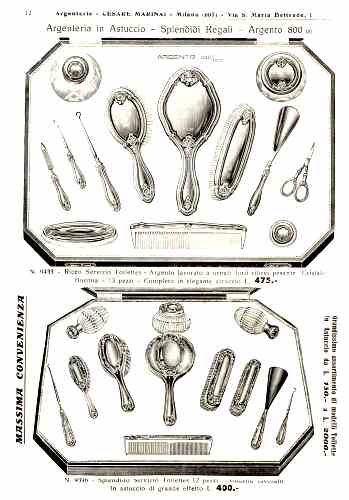
|
This month
ASCAS presents the images of two toilet sets from the
1929 'CESARE MARINAI FABBRICA ARGENTERIA DA REGALO -
MILAN (ITALY)' catalog
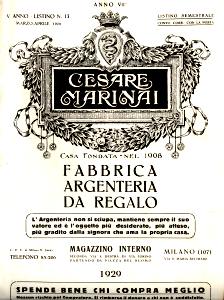
|
What is this piece ???
Fredric Sinfield writes:
...Here is a mystery piece you may like to include in a
newsletter. It is acorn shaped, 60mm x 35mm and weighs 85grams
without the chain.
The acorn lid is hinged and opens by the fleur de lis. It is
only about 30mm deep inside.
There are two small purple and two green stone cabochons set
onto the hinged lid.
The chain is 900mm long and weighs 50grams.
There are no marks so there are no clues to its origin, when or
where made or its purpose.
Might a reader recognise it?
Thanks,
Fred.
I know two examples of use of a
similar 'acorn' container:
in my private
collection I have this silver acorn (presumably
Continental) containing a collapsible telescopic
cigarette or cheroot holder. It has the mark '900' (silver
900/1000) and another unidentified mark.
The acorn is 1 in. wide (cm.2,5), the (extended)
cigarette holder is 1 1/2 in. wide (cm. 4)
|
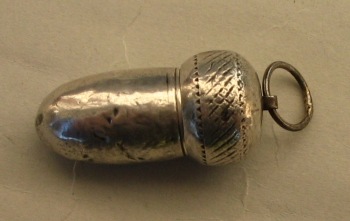
|
on the web I have seen
this continental silver hinged egg sewing set
pendant marked on the catch MUSTER SCHUTZ
A suspension loop gives the option to wear as a
jewel. It contains a neatly fitted complete sewing
kit:
- a thread winder which can take three different
coloured threads;
- a silver thimble marked (size) 7 and English
silver hallmarks for Chester 1909 makers M & C.
The inside of the egg is made to hold 12 pins, which
are housed in holes around the circular rim. Six
gold pins remain. It is 1, 3/4" long x 1,1/8" wide
(cm. 4,5 x cm. 2,9)
|
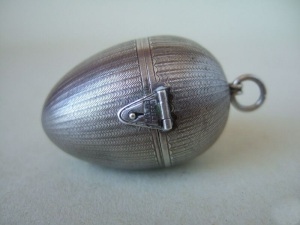
|
I hope that ASCAS members will
supply further ideas and information about the use of 'silver
acorns'.
Giorgio Busetto
A new book:
LES ORFEVRES DE LILLE

Nicole Cartier announces the
publication of her new book about ancient French silver. The
book is in French and the information may be useful for ASCAS
readers who understand the French language.
 Monsieur, pouvez vous diffuser auprès de vos membres la
publication du livre sur les orfèvres et l'orfèvrerie de Lille
(Nord de la France), 3e ville du royaume au XVIIIe siècle par le
nombre de ses orfèvres et une production très importante.
Monsieur, pouvez vous diffuser auprès de vos membres la
publication du livre sur les orfèvres et l'orfèvrerie de Lille
(Nord de la France), 3e ville du royaume au XVIIIe siècle par le
nombre de ses orfèvres et une production très importante.
Avec mes remerciements
Nicole Cartier
(cliquez ici pour le
bon de souscription)
DISCLAIMER AND PRIVACY POLICY
ASCAS is a community of people having a common
interest in antique silver.
It is a no-profit association without commercial links.
Membership is open to whomever have a true interest in
this subject matter.
ASCAS has no real property and no fees are requested nor
accepted from members.
ASCAS keeps in touch with its members only through
periodical newsletters, e-mails and web-site updating
and ignores and is not responsible for any other
activity pursued by its members.
Likewise, ASCAS is not responsible for opinions,
evaluation and images displayed, and in any form
published or supplied for publication, by its members
who, in any case, maintain the property of their works
and assure the respect of national and international
legislation about Intellectual Property.
ASCAS does not have the full addresses of its members (only
town, country and e-mail address are requested for
membership).
ASCAS handles and protects with care its members e-mail
addresses, will not disclose the addresses to third
parties, will use this information only to reply to
requests received from members and for communications
strictly related to its activity.
These rules are expressly accepted by submitting the
membership request.
|
|
 newsletter # 28 August 2006
newsletter # 28 August 2006